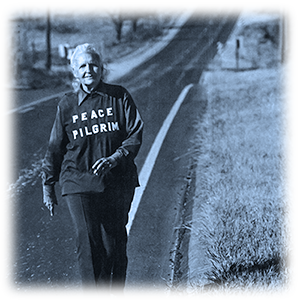

Peace Pilgrim
"Peace Pilgrim" was an extraordinary woman who dedicated her life to spreading the message of peace by walking over 25,000 miles throughout the USA during the years 1953 to 1981.
Her message was simple:

"This is the way of peace: Overcome evil with good,
and falsehood with truth, and hatred with love."
And she vowed that she would:
"Remain a wanderer until mankind has learned the way of peace - walking until given shelter and fasting until given food."
And that's exactly what she did. Each day for many many years, she walked throughout the USA with her only possessions the clothes on her back and a few simple items in her tunic pouch. She never directly asked for food or shelter, she would simply spread her message and  towards the end of the day someone would ask her if she had eaten, or if had a place to spend the night. When she said, "No", they would ask her to come home with them and share their meal and home for the evening. Then the next morning she would be off on her mission, walking many more miles spreading her message. Believe it or not she walked back and forth across the USA from coast to coast several times!
towards the end of the day someone would ask her if she had eaten, or if had a place to spend the night. When she said, "No", they would ask her to come home with them and share their meal and home for the evening. Then the next morning she would be off on her mission, walking many more miles spreading her message. Believe it or not she walked back and forth across the USA from coast to coast several times!
Here, in her words, are her suggestions for beginning
a life dedicated to peaceful living.
The Four Preparations:
1. Assume right attitude toward life
"Stop being an escapist or a 'surface-liver', as these attitudes can only cause inharmony in your life. Face life squarely and get down below the froth on its surface to discover its verities and realities. Solve the  problems that life sets before you, and you will find that solving them contributes to your inner growth. Helping to solve collective problems contributes also to your growth, and these problems should never be avoided."
problems that life sets before you, and you will find that solving them contributes to your inner growth. Helping to solve collective problems contributes also to your growth, and these problems should never be avoided."
2. Live good beliefs.
"The laws governing human conduct apply as rigidly as the law of gravity. Obedience to these laws pushes us toward harmony; disobedience pushes us toward inharmony. Since many of these laws are already common belief, you can begin by putting into practice all the good things you believe. No life can be in harmony unless belief and practice are in harmony."
3. Find your place in the Life Pattern.
"You have a part in the scheme of things. What that part is you can know only from within yourself. You can seek it in receptive silence. You can begin to live in accordance with it by doing all the good things you are motivated toward and giving these things priority in your life over all the superficial things that customarily occupy human lives."
4. Simplify life to bring inner and outer well-being into harmony.
"Unnecessary possessions are unnecessary burdens. Many lives are cluttered not only with unnecessary possessions but also with meaningless activities. Cluttered lives are out-of-harmony lives and require simplification. Wants and needs can become the same in a human life and, when this is accomplished, there will be a sense of harmony between inner and outer well-being. Such harmony is needful not only in the individual life but in the collective life too."
The Four Purifications
1. Purification of the bodily temple.
"Are you free from all bad habits? In your diet do you stress the vital foods - the fruits, whole grains, vegetables and nuts? Do you get to bed early and get enough sleep? Do you get plenty of fresh air, sunshine, exercise, and contact with nature? If you can answer "Yes" to all of these questions, you have gone a long way toward purification of the bodily temple."
2. Purification of the thoughts.
"It is not enough to do right things and say right things. You must also think right things. Positive thoughts can be powerful influences for good. Negative thoughts can make you physically ill. Be sure there is no unpeaceful situation between yourself and any other human being, for only when you have ceased to harbor unkind thoughts can you attain inner harmony."
3. Purification of the desires.
"Since you are here to get yourself into harmony with the laws that govern human conduct and with your part in the scheme of things, your desires should be focused in this direction."
4. Purification of motives.
"Obviously your motive should never be greed or self-seeking, or the wish for self-glorification, you shouldn't even have the selfish motive of attaining inner peace for yourself. To be of service to your fellow humans must be your motive before your life can come into harmony."
The Four Relinquishments
1. Relinquishment of self-will.
"You have, or it's as though you have, two selves: the lower self that usually governs you selfishly, and the higher self which stands ready to use you gloriously. You must subordinate the lower self by refraining from doing the not-good things you are motivated toward, not suppressing them but transforming them so that the higher self can take over your life."
2. Relinquishment of the feeling of separateness.
"All of us, all over the world, are cells in the body of humanity. You are not separate from your fellow humans, and you cannot find harmony for yourself alone. You can only find harmony when you realize the oneness of all and work for the good of all."
3. Relinquishment of attachments.
"Only when you have relinquished all attachments can you be really free. Material things are here for use, and anything you cannot relinquish when it has outlived its usefulness possesses you. You can only live in harmony with your fellow humans if you have no feeling that you possess them, and therefore do not try to run their lives."
4. Relinquishment of all negative feelings.
"Work on relinquishing negative feelings. If you live in the present moment, which is really the only moment you have to live, you will be less apt to worry. If you realize that those who do mean things are psychologically ill, your feelings of anger will turn to feelings of pity. If you recognize that all of your inner hurts are caused by your own wrong actions or your own wrong reactions or your own wrong inaction, then you will stop hurting yourself."
* * *
If you liked this article, you might also like these: "The Tao of Peaceful Social Change" and "The Blessings of a Pleasant Disposition".